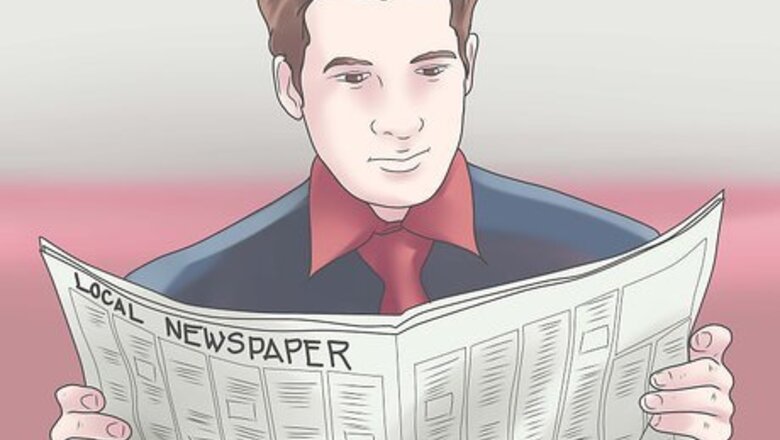
views
Finding Coupons
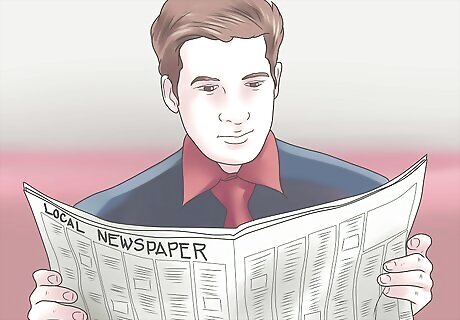
Subscribe to the Sunday newspaper. The Sunday paper is the traditional go-to place for coupons, since it tends to have several coupon inserts. When you're just getting started, you might be happy with one copy, but true extreme couponing requires more than one copy of each coupon. Most extreme couponers need at least four copies of the newspaper, so to avoid purchasing so many papers, ask neighbors, friends, or family for their inserts if they will not use them. Another way to get extra inserts is to check coffee shops. People often leave newspapers there when they are finished reading them, and not many people take the coupon inserts. Don't be afraid to go dumpster diving for inserts. In some areas, stores recycle their unsold papers with inserts, so check recycling bins outside of places like Starbucks on Monday mornings. Sometimes the newspaper itself does not use all the inserts and throws away many copies. Serious couponers know that the newspaper office dumpster can be a goldmine on Sundays.
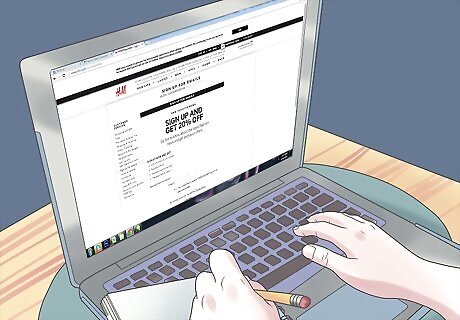
Look for printable coupons online. Sites offer many manufacturer coupons that you can print out at home. You can choose which ones you want and only print the ones you will use. Some popular coupon sites include www.coupon.com, www.redplum.com, or www.smartsource.com. If there is a certain product you need a coupon for, try doing a Google image search for the product name plus the word coupon (for example, "toothbrush coupon") or a more specific search if you want a certain brand or type. You can also check manufacturer websites, sign up for emails from companies and manufacturers, and check retailer websites for current coupons.
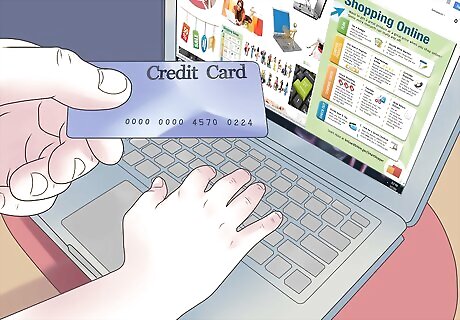
Purchase coupons. If you know you are definitely going to make use of a coupon, buying it for less than its face value can be a good way to save money. You can purchase copies of coupons at online at sites like The Coupon Clippers or eBay. You can buy single coupons or whole newspaper inserts. You can also check your local Craigslist or Freecycle website for people selling or giving away coupons. Be sure that if you do buy coupons from a stranger, you meet up with them in a public, well-lit place like a local grocery store or bank. Never give them your home address and never meet up after dark or in a secluded location.
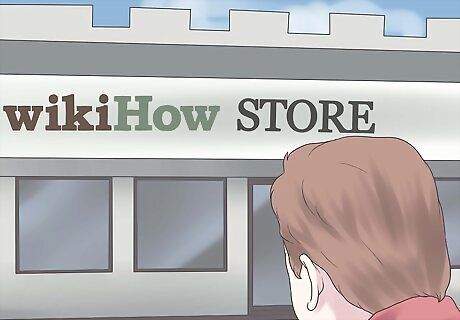
Check your grocery stores for store coupons. Many grocery stores are learning the value of offering small discounts on products and have begun to offer coupons in the store itself. Many stores have devices that give out in-store coupons in the aisles or next to product displays. Some stores also have their own coupon booklets. Some stores print out coupons on the back of or in addition to your receipt at check-out. In this case, of course, you'll have to use the coupons at your next visit.
Organizing Your Coupons
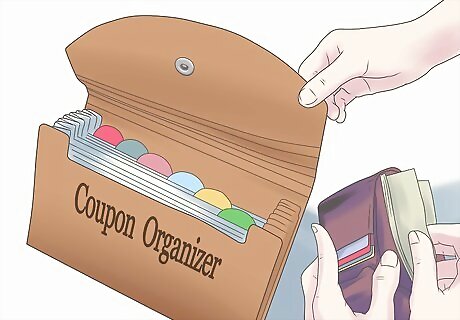
Make a coupon binder to hold all your coupons. Using a binder will allow you to easily see all your coupons and when they expire. It is very portable and can be easily taken with you in the grocery store. One popular way to organize coupons is to use baseball card sheets in your binder. These clear plastic sheets have openings sized just right so you can slip the coupons in and out easily.
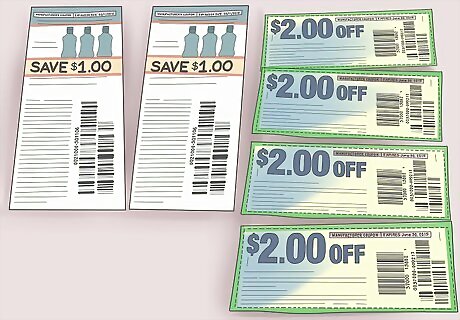
Group your coupons for easy access. You can group your coupons any way you wish within the binder, but finding a way that works for you is key to a manageable extreme couponing experience. Some coupons make sense to organize by store. If your coupon is only good at a particular retailer, it makes sense to group it with other coupons for that retailer so that you don't forget to use it while you're there. Most other coupons make sense to organize by type: dairy, produce, meat and snacks for example. If you're very organized, you can then organize the sheets themselves based on the path you walk through the grocery store (shelf-stable foods and households goods first, then produce, then refrigerated and frozen goods last).
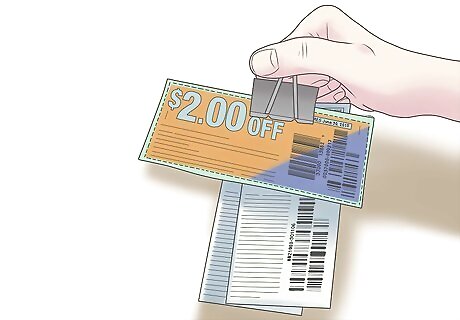
Consider other ways to organize within the sheets. The more organized each sheet of coupons is when you go to the store, the easier it will be to find the products you need, remember what you are combining, and make a successful purchase. On a given sheet, put coupons you definitely plan to redeem at the top of the page. Organize the rest by expiration date so that you won't forget to use them before they expire. If you don't know for sure which coupons you will use, file coupons as whole inserts. Instead of clipping coupons and filing them individually, you will file whole inserts together. If you have 4 of the same insert, file them all together. When it is time to use your coupons, you can just clip the ones that you will need.
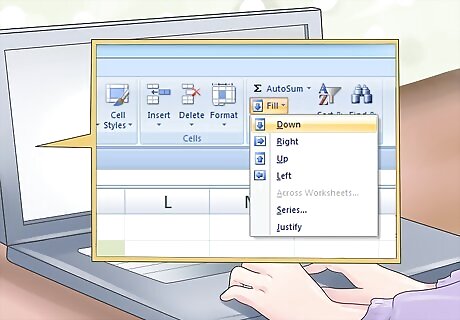
Use a spreadsheet. A spreadsheet can help you organize the coupons you have and the savings you accrue, so you will learn what strategies work best. If you're familiar with Microsoft Excel, using formulas can make the process much simpler. Some people use spreadsheets to keep track of each individual coupon, but that can be tedious. Instead, aim to track your total savings at each store. Use headings on the spreadsheet such as date, store, total savings, and total spent in the transaction. Use Excel SUM formulas to total each column as you go. Fill in the amounts after every shopping trip and let Excel do the rest of the work for you. You can visit popular couponing website Krazy Coupon Lady at http://thekrazycouponlady.com/tips/couponing/extreme-couponing-tip-tracking-savings-spreadsheets/ for a free downloadable spreadsheet.
Redeeming Your Coupons
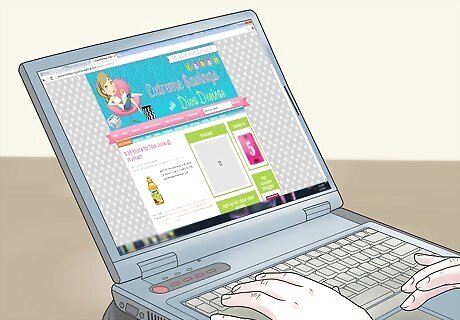
Check your local store policies. Stores vary in how many coupons they will accept and under what circumstances, so you need to know before you go in and spend a lot of time gathering products. Read the store's website and/or ask the store manager what their policies are regarding coupons. Many stores will accept up to four identical coupons for a single purchase. For instance, if you have four $1 off Colgate coupons, you can use all four and save $4 on a single tube of toothpaste, which essentially will make the tube free. Still other stores, like Target, will allow one manufacturer coupon and one retailer coupon per item. Other stores, however, will only allow one coupon. These stores are not the best for extreme couponing as you only get a great deal if you have a very high value coupon. The best stores for extreme couponing will accept more than one coupon and will also double the value of coupons. This means if the coupon is for $.25 off, they will value it as $ .50 off. If they do double, make sure to find out if there are any limits on doubling, or if they only double on certain days.
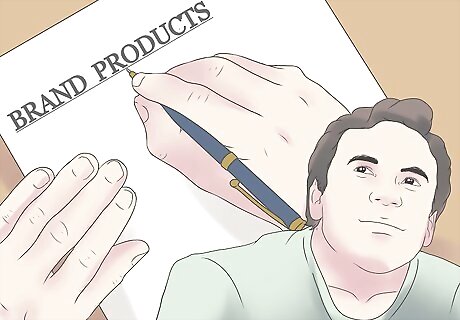
Know what to ask. Since store policies vary, its important to keep a running list of every store you frequent, along with answers to questions about their specific store policies. Check to see if the stores offer any kind of discounts for seniors, students, or military. Ask if they will price match competitors' ad prices and accept a coupon for the item on top of that. If a store does "BOGO" or buy-one-get-one free sales, ask if you have to buy two products to get the sale price. For instance, some stores will advertise BOGO shredded cheese, but actually you can choose to just buy one bag and get it at 50% off. Other stores require you to buy both bags of cheese to take advantage of the sale. Either policy is good, but the first policy allows you to take advantage of coupons on top of the sale and enjoy a larger percent savings.
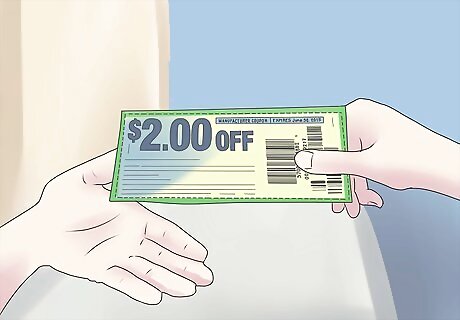
Match up your coupons with store circulars. In order to maximize your savings, you need to combine sales, promotions, and coupons. For instance, if Target is having a special sale of a particular brand of yogurt for $2 and it is normally $3, you can use your two $1 off coupons and get it for free. Decide which coupons are worth redeeming. Its not a good deal if you are buying a product you don't need and won't use, unless the item is shelf-stable. Coupons are really only worth redeeming if you would be buying the product regardless, or if the savings will make the product virtually free and you can give it to someone else. Check your weekly circulars for items that are on sale. Match up the coupons that you have with the items that are on sale. If you have multiples of the coupon, get as many of that item as you can, as long as the item is nonperishable. This will allow you to stock up on items so that you will never have to pay full price for something if you run out. Take advantage of matching sales with coupons at stores that allow you to double coupons. Look for "buy-one-get-one" deals and use a coupon on that. Some stores will allow you to use a coupon on the 2nd item that is discounted, so you can get even more savings.
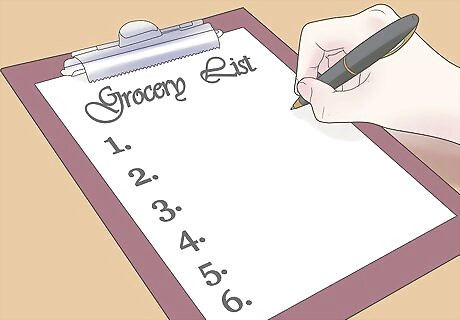
Make your plan. Depending on the types of coupons that you have gathered and the promotions at stores, you can take a couple of extreme couponing approaches: Doubling: Some stores will match the value of a coupon, so that you end up saving double the face value of your coupon. This is an especially good strategy if the coupon value is high and the item itself is on sale. Stacking: Some stores will allow you to use a manufacturer's coupon and a store coupon. Store-specific policies: Some stores will allow discounts for students, military, or senior citizens. Some will price-match other stores.
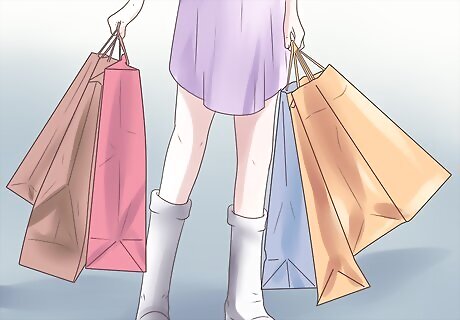
Expect bizarre reactions. Many extreme couponers experience negative or surprised reactions from sales clerks and other customers when they buy many identical items, and sometimes face resistance to complete the sale. Sometimes cashiers are unaware of their own store's policy and will refuse to do a transaction. If you have read the store's policy, its a good idea to politely ask to speak to the manager. Occasionally, even a manager will refuse to allow a transaction that is within the company's policy. In that case, you don't have much recourse except to try another store. You can mitigate some of these reactions a bit by timing your shopping trip for when the store is very slow (try 8 am on a Tuesday for example), instead of timing it for rush hour or a weekend when your coupon redemption process will hold up the line at check-out.














Comments
0 comment